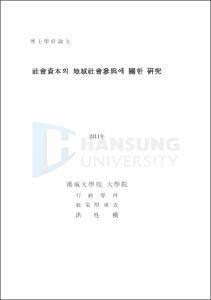社會資本의 地域社會參與에 關한 硏究
= A Study on Social Capital and Community Participation
- Files in This Item:
-
-
Download
 000000900338.pdf
기타 데이터 / 1.42 MB / Adobe PDF
000000900338.pdf
기타 데이터 / 1.42 MB / Adobe PDF
-
Items in Repository are protected by copyright, with all rights reserved, unless otherwise indicated.